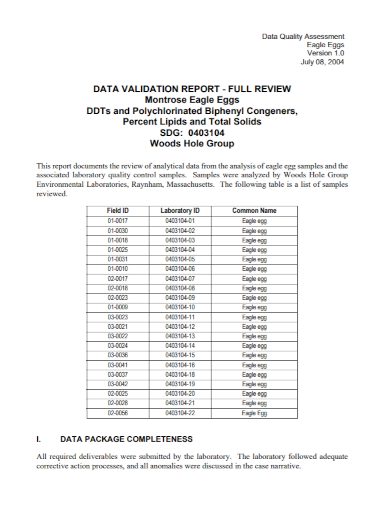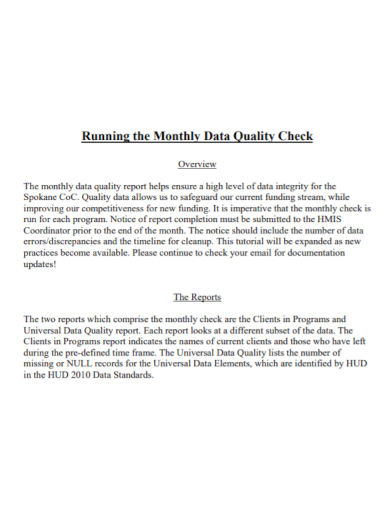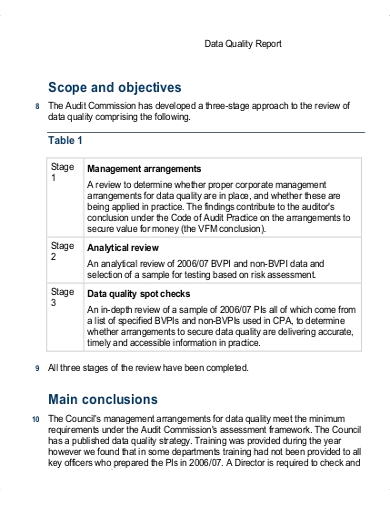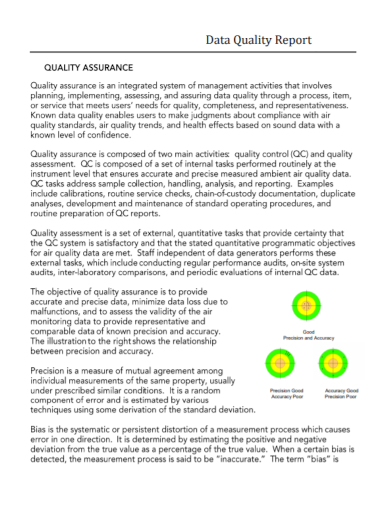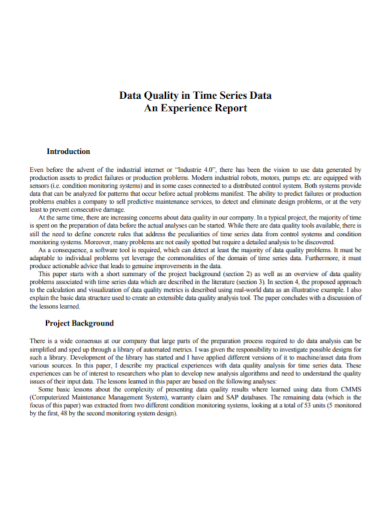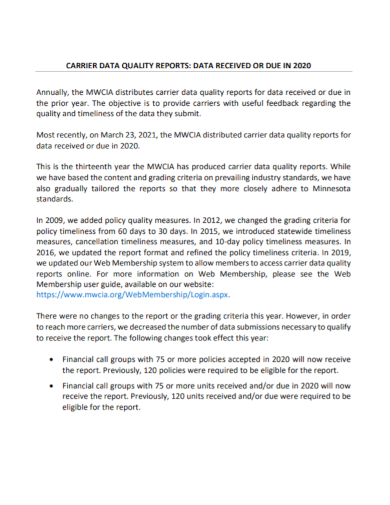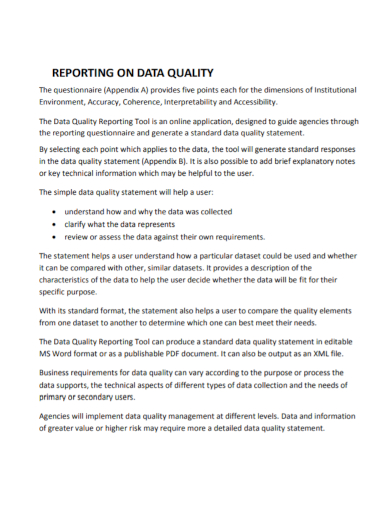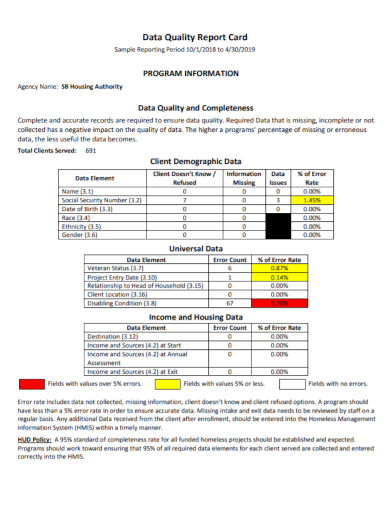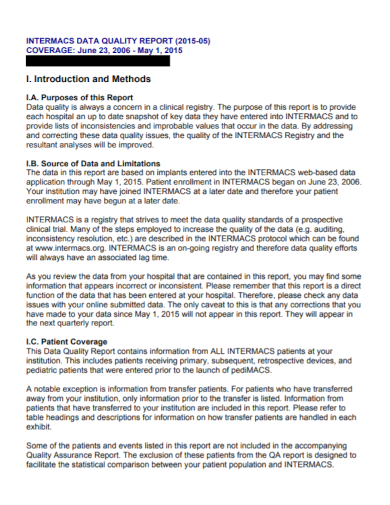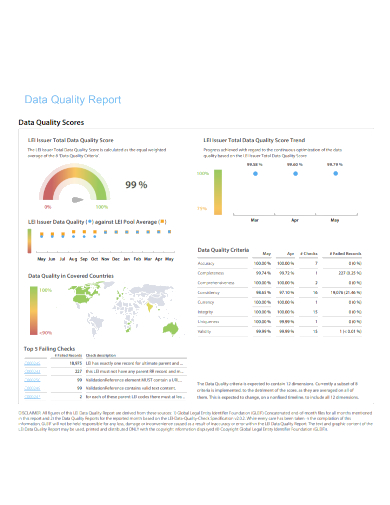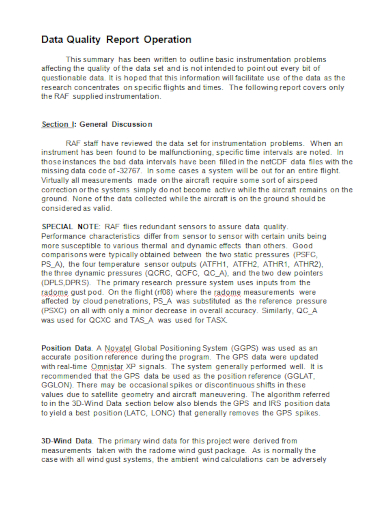10+ Data Quality Report Samples
Every company, institution or business establishment needs to have Data management and Data Quality reports every now and then to ensure the efficacy of their IT systems and data security. Data quality is a measure of the condition of data based on factors such as accuracy, completeness, consistency, reliability and whether it’s up to date. Data quality is a measurement of how fit a data set is to serve the specific needs of an organization. High quality data is required for trusted decisions. How you define data quality is somewhat variable depending on the requirements of the business, a particular data set may be seen as high-quality by one organization and low quality by another. Nevertheless, this should be clearly expounded and put together in a report called Data Quality Report. In making this, you might find yourself having a hard time especially doing it from scratch. To avoid this hassle, our site gives you a wide choices of available, free, and ready-made (yet customizable) templates that you can choose from. Just browse among these templates and choose the one that satisfies your needs the most.
For other report template needs, our site offers templates like Monthly Status Report, Project Weekly Status Report, Weekly Construction Progress Report, Individual School Report, Problem Solving Report, Daily Sales Report, Action Research Report, Construction Feasibility Report, Network Feasibility Report, etc. Our article does not only give you free and ready-made templates but also provide you with ideas that are essential in making one. So what are you waiting for? Come! Read the article with me.
1. Data Quality Assessment Report
2. Monthly Data Quality Report
3. Sample Data Quality Report
4. Data Quality Assurance Report
5. Data Quality Time Series Report
6. Carrier Data Quality Report
7. Standard Data Quality Report
8. Data Quality Report Card
9. Patient Data Quality Report
10. Data Quality Score Report
11. Data Quality Operation Report
Data Quality
Measuring data quality levels can help organizations identify data errors that need to be resolved and assess whether the data in their IT systems is fit to serve its intended purpose. The emphasis on data quality in enterprise systems has increased as data processing has become more intricately linked with business operations and organizations increasingly use data analytics to help drive business decisions. Data quality management is a core component of the overall data management process, and data quality improvement efforts are often closely tied to data governance programs that aim to ensure data is formatted and used consistently throughout an organization.
Why Data Quality Is Important?
Bad data can have significant business consequences for companies. Poor-quality data is often pegged as the source of operational snafus, inaccurate analytics and ill-conceived business strategies. Examples of the economic damage that data quality problems can cause include added expenses when products are shipped to the wrong customer addresses, lost sales opportunities because of erroneous or incomplete customer records, and fines for improper financial or regulatory compliance reporting.
What Is Good Data Quality?
Data accuracy is a key attribute of high-quality data. To avoid transaction processing problems in operational systems and faulty results in analytics applications, the data that’s used must be correct. Inaccurate data needs to be identified, documented and fixed to ensure that executives, data analysts and other end users are working with good information.
Other aspects, or dimensions, that are important elements of good data quality include data completeness, with data sets containing all of the data elements they should; data consistency, where there are no conflicts between the same data values in different systems or data sets; a lack of duplicate data records in databases; data currency, meaning that data has been updated as needed to keep it current; and conformity to the standard data formats created by an organization. Meeting all of these factors helps produce data sets that are reliable and trustworthy.
FAQs
What are some elements of quality data?
Consistency. Data has no contradictions in your databases.
Accuracy. Data is error-free and exact.
Completeness.
Auditability.
Validity.
Uniqueness.
Timeliness.
Who is responsible for data quality?
The IT department is usually held responsible for maintaining quality data, but those entering the data are not. “Data quality responsibility, for the most part, is not assigned to those directly engaged in its capture,” according to a survey by 451 Research on enterprise data quality
What criteria is used to measure data quality?
Accuracy: for whatever data described, it needs to be accurate.
Relevancy: the data should meet the requirements for the intended use.
Completeness: the data should not have missing values or miss data records.
Timeliness: the data should be up to date.
You might find yourself getting caught up in the report that you are making especially that you’ve got to do it from the very scratch. With this, it is highly encouraged of you to make available all the resources you can find online. What are you waiting for? Avail our templates in SampleTemplates now!
Related Posts
FREE 12+ Sample Testing Reports
FREE 11+ Data Management Plan Samples
FREE 11+ Clinical Audit Report Templates
FREE 11+ External Audit Report Samples
FREE 10+ Analytical Report Samples
FREE 10+ Sample Data Analysis
FREE 10+ Student Assessment Reports Samples
FREE 10+ Research Analysis Report Samples
FREE 8+ Sample Job Evaluation Reports
FREE 47+ Report Format Samples
FREE 13+ Sample Quality Manuals
FREE 11+ Variance Analysis Report Samples
FREE 11+ Engineering Audit Report Samples
FREE 11+ Laboratory Audit Report Samples
FREE 10+ Qualitative Data Analysis Samples

